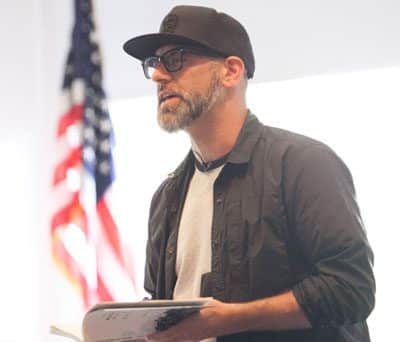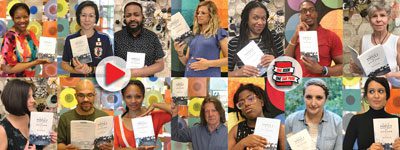As we head into fall and a new school year, we reflect on our visit with poet Kevin Coval, author of this summer’s One Book, One Oak Park selection.
Coval joined us for an evening at the Main Library in June to read from his collection of poetry, A People’s History of Chicago, which honors the often repressed stories of poor people and people of color in Chicago. He also spoke about his work with youth poetry festival Louder Than a Bomb, his love for hip-hop, and how its “culture of digging” inspired him to search out books at his local public library. (See video of his entire appearance on Facebook »)
Learning from each other
In a Q&A afterward, Oak Park resident Jackie Moore stood to ask the final question.
Moore, president of the Oak Park and River Forest High School Board of Education, wondered how more people, regardless of age or race, could embrace hip-hop and the stories of young people. She questioned why white European history and authors are standard in classrooms.
“What is a way to make it so that the respect and the stature that is given to certain authors or writers or artists can be shared, so that we learn from each other, learn from our kids?” Moore asked.

The path forward in both parenthood and education, Coval said, is to be a bridge. “And not a bridge into what I know and like, but a bridge for the student to become engaged in the process for the entirety of their lives, of being someone who self-educates.”
In his own education, he said, hip-hop and the public library led him to books like The Black Poets, which introduced him to Gwendolyn Brooks and poetry in the language of the working class.
“Ms. Brooks, Studs [Terkel], Ida B. Wells, Upton Sinclair were listeners who built a bridge to people who were not like themselves. And I think that is our only way forward in a country that is deeply divided, in a city that maintains that division,” he said. “It is on us to be and build the bridge.”
 Listen: More voices
Listen: More voices
Library staff added their voices by reading personal favorites from A People’s History of Chicago, helping bring Coval’s poetry alive in 17 different video readings.

